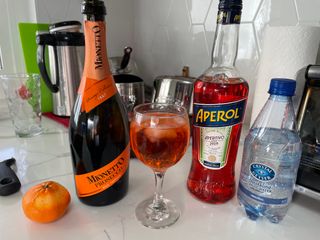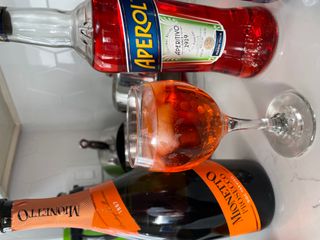Spritz was born during the period of the Habsburg domination in Veneto in the 1800s, under the Kingdom of Lombardy–Venetia. The soldiers, but also the various merchants, diplomats and employees of the Habsburg Empire in Veneto became quickly accustomed to drinking local wine in the taverns, but they were not familiar with the wide variety of wines from the Veneto, and the alcohol content was higher than they were accustomed to. The newcomers started to ask the local hosts to spray a drop of water into the wine (spritzen, in German) to make the wines lighter; the real original spritz was composed of sparkling white wine or red wine diluted with fresh water.
The Italian aperitif Aperol was created in Padua in 1919 by the Barbieri brothers. The original recipe has supposedly remained unchanged over time but it wasn't until the 1950s that Aperol Spritz became a popular alternative to the usual Venetian mix of white wine and soda.
In 2003 the Aperol brand was acquired by Campari Group. The Group positioned Aperol Spritz as "the perfect drink for social occasions", increasing sales to four times the pre-acquisition levels.
A ready-to-enjoy-drink version of the Aperol Spritz was launched by the company in 2011, which contained just 8% of alcohol. This was intended to give consumers a chance to enjoy the drink at home with minimal effort, by simply adding ice and an orange slice.
On June 29, 2012, Aperol Spritz ventured for a Guinness World Record as the "Largest Aperol Spritz Toast". More than 2,600 people descended onto Piazza San Marco in Venice and successfully secured the title. On April 16, 2019, the celebration of the Aperol centenary was announced at a press conference in Padua.
In 2019, Rebekah Peppler wrote a controversial New York Times piece, "The Aperol Spritz Is Not a Good Drink", criticizing the use of low-quality prosecco, the sugary taste of aperol, and dilution from ice in comparing it to a Capri Sun. This sparked an outcry, including a "Rally for Aperol" in Brooklyn.
Over the years the drink has "grown up" with the infinite variety of possible additions such as a sort of liquor (Aperol, Campari, Select, Jardesca California Aperitiva) or a bitter as the China Martini or Cynar with a lemon peel inside.

